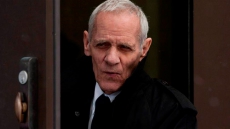LINDSAY, Ont. — Sending Dean Del Mastro to jail for between nine to 12 months is the only way to properly denounce his election overspending violations and discourage others from following in his footsteps, a Crown lawyer argued Thursday.
It's essential that the convicted former Conservative MP's punishment deliver a clear message to others, prosecutor Tom Lemon told Del Mastro's sentencing hearing in Lindsay, Ont.
"For Mr. Del Mastro, in the Crown's submission, nothing less than a period of imprisonment of nine to 12 months would adequately reflect the gravity of the offences and the degree of his responsibility," Lemon said.
"Moreover, anything less than real jail would fall short of properly denouncing his conduct and adequately deterring him and others from committing these or similar offences."
Lemon also asked that Del Mastro be required to pay $10,000 to the Peterborough Conservative Party Electoral District Association to reimburse money he "fraudulently obtained from them" for a contract with a data consulting firm.
Del Mastro— Prime Minister Stephen Harper's one-time point man on defending the Tories against allegations of electoral fraud — was convicted last fall of violating the Canada Elections Act during the 2008 election.
He resigned his House of Commons seat days later, but has maintained his innocence throughout his legal battles.
His sentencing hearing was supposed to take place last month, but it was postponed after his lawyer made an application to have a mistrial declared in the case.
Justice Lisa Cameron, who presided over Del Mastro's trial, dismissed that application, saying there was no fresh evidence in the case — nor any new laws that have come into effect since her judgment — to warrant re-opening the matter.
Del Mastro was found guilty of exceeding spending limits, failing to report a personal contribution of $21,000 to his own campaign and knowingly submitting a falsified document.
He faces a maximum penalty of one year in jail and a $2,000 fine on each of the three convictions.
"The essence of the federal election financing system is to ensure that all Canadians have a fair and equitable chance to be heard and elected," Lemon explained.
"These provisions seek to create a level playing field for those who wish to engage in electoral discourse. This in turn enables voters to be better informed. No one voice is louder than another."
By not fully declaring voter identification and get-out-the-vote calling services as election expenses, Del Mastro shifted the dynamics of the 2008 election campaign in his Peterborough riding, Lemon argued.
"Not claiming polling, voter ID and get-out-the-vote calling allowed Mr. Del Mastro to do more advertising. And in allowing him to do that, it allowed him to control more of the discourse during the election," he said.
"In that sense it interfered with the right of the other candidates and other campaigns to run in an election, but also of the voters to make an informed decision."
Lemon noted that Del Mastro was favoured to win that election, but "was not in the mood to take any chances."
"Mr. Del Mastro chose not to leave it to chance and to influence the result of the election by exceeding his spending limit," he said. "Whether it was necessary or not, he felt it was necessary."
Lemon also pointed out that Del Mastro was not a first-time candidate in 2008, and was familiar with campaign spending limits.
"Mr. Del Mastro, as a holder of public office ... is held to a very high standard and it shouldn't be any other way."
Del Mastro sat with a sombre look on his face as sentencing arguments in his case got underway. His wife and baby daughter accompanied him to court.





